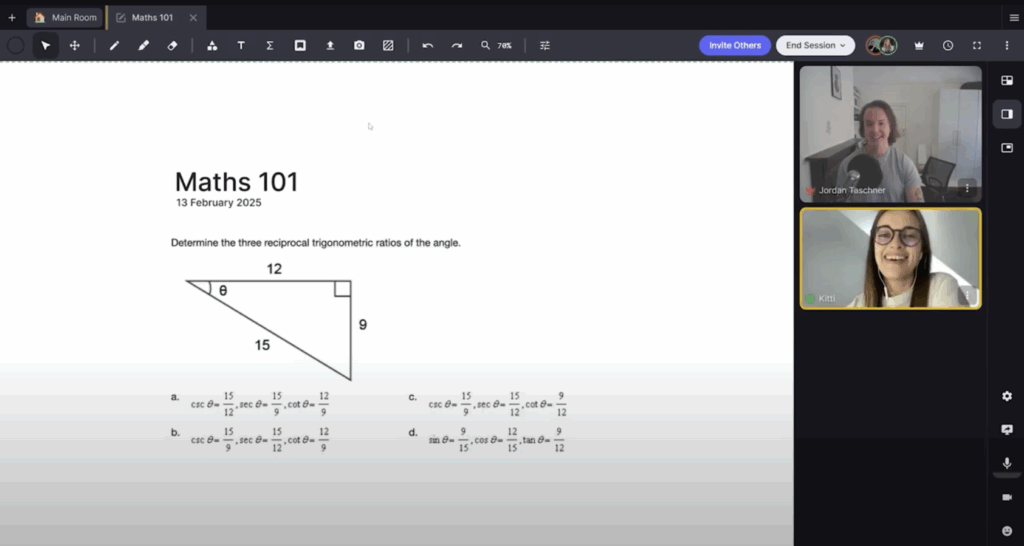Online tutoring has surged in popularity since COVID-19 — but the big question remains: does it work as well as face-to-face? Short answer: yes, for most learners, when it’s done well. Below, we unpack the evidence and the real-world pros and cons so you can choose the format that fits you (or your child) best.
Is online tutoring effective? What the research says
Multiple large reviews and recent trials show that tutoring delivered online can produce learning gains comparable to face-to-face — and sometimes better — when three ingredients are present: regular sessions, clear goals aligned to the curriculum, and rapid, specific feedback. In other words, consistency and quality drive results more than the delivery mode.
Research at a glance
-
Meta-analysis (PreK-12): A large review of dozens of high-quality tutoring experiments across primary and secondary school found that tutoring reliably improves results and results in large gains - especially when it’s 1:1 or in small groups with regular sessions.
-
Secondary maths (online): A randomised trial in Spain tested an eight-week, fully online maths program delivered in pairs after school by qualified teachers. The trial produced significant improvements and students lifted standardised maths scores and end-of-year grades and were less likely to repeat a year.
-
Middle school (online 1:1): An Italian program matched under-served middle-schoolers with university tutors for about three hours/week of individual online tutoring. Students saw increased maths performance, with student performance rising by roughly 0.20–0.23 standard deviations, with 1:1 tutoring and higher dosage driving the strongest gains.
-
Early literacy (online): The first randomised trial of fully virtual early-reading tutoring (K–2) ran four 20-minute sessions per week across 12 US schools; tutored students outperformed peers on key early-reading measures (e.g., phonics, decoding, fluency) and saw relative overall boosted K-2 reading skills.
- What matters online: Rapid evidence reviews on remote learning found the biggest levers of effective online learning were clear goals and teaching quality, active engagement, and timely, specific feedback—the “how” of the lesson matters more than the “where.”
Benefits of online tutoring: convenience and flexibility
One of the biggest advantages of online tutoring is convenience. With a reliable internet connection, students can learn from anywhere and fit sessions around busy schedules — sport, music, part-time work, you name it. Many platforms also allow recordings, so students can revisit tricky explanations in their own time.
- Learn anywhere, no commute
- Easier to schedule (and reschedule)
- Replay explanations if recordings are enabled
Accessibility: find the right expert beyond your postcode
In-person options are limited to who lives nearby. Online, you can search a much wider pool to find the best subject-and-personality match — a major driver of learning outcomes. On Learnmate, we see this every day: a Year 12 student in regional NSW working seamlessly with an online English, maths or science tutor based in WA — because they’re the right fit.
Technology that makes online tutoring work
Modern tools make online learning highly interactive:
- Interactive whiteboards for working through problems together
- Real-time document sharing for essays, reports and problem sets
- Video conferencing with screen share and annotation for step-by-step walkthroughs
Learnmate’s online classroom is built to keep sessions focused: shared tasks, live feedback and collaborative problem-solving minimise distractions and mirror the best parts of a traditional classroom — sometimes even surpassing it.

Safety and comfort: learning in a secure environment
Online lessons take place in a safe, familiar setting at home. Learnmate prioritises the safety and wellbeing of students and tutors through a secure platform and best-practice guidance. For younger learners, we recommend lessons are supervised or within earshot of a parent or responsible adult.
Cost-effectiveness: what families actually pay
Online tutoring often reduces the total cost of learning by removing travel time and expenses. On Learnmate, hourly rates start from around $30/hour, with savings available when prepaying for lesson packages. That keeps high-quality support accessible for more families.
Potential drawbacks — and how to manage them
Online tutoring isn’t perfect for everyone. Here’s how to address common challenges:
- Fewer non-verbal cues? Build in frequent “check-for-understanding”, use the whiteboard, and ask the student to “teach back” key steps.
- Tech hiccups? Do a quick device/internet check before lesson one; agree on a hotspot or reschedule plan in advance.
- Needs in-person structure? Some students stay more focused face-to-face — that’s okay. Choose the format that keeps them engaged and confident.
Bottom line: pick the format that fits the learner
Both formats can deliver excellent results. The biggest predictors of success are consistency, tutor quality and feedback cadence — not whether the lesson is on a screen or at a table. If travel or time is a barrier, online tutoring usually wins on convenience without sacrificing effectiveness.
How to trial online tutoring in 3 simple steps
- Book a 30–45 minute session focused on one clear goal (e.g., “factorising quadratics” or “topic sentences”).
- Agree on what success looks like by the end of the session.
- Review the fit together: Did you learn something new? Did you feel engaged? Would you like to keep going?
FAQs
Yes. When lessons are regular, goals are clear, and feedback is timely, online tutoring produces gains comparable to face-to-face for most students.
It can — particularly for structured early literacy and numeracy. Keep sessions short and frequent, and ensure a parent is nearby to support focus and setup.
A laptop or tablet, reliable internet, a quiet space, and ideally a headset and webcam. A stylus or tablet is handy for maths and science working.
Rates vary by subject, level and tutor experience. On Learnmate, tutors start from around $30/hour and online tutors are typically cheaper than in-person tutors. You can also save with prepaid lesson packages on Learnmate.
Use Learnmate’s filters for subject, year level, availability and price. Read profiles and reviews, then shortlist two or three tutors and book an initial session to check the fit.
Clear objectives, interactive tools (whiteboard/doc sharing), active questioning, and specific, actionable feedback during the lesson.
Absolutely. Senior students benefit from targeted practice, exam strategies and syllabus-aligned feedback — all of which translate seamlessly to online lessons. Students in Year 12 often know what they want from lessons and can be more prescriptive around lesson format, focus and delivery. This also helps to ensure it is effective.
Pick the option that maximises attendance, focus and tutor fit. If travel/time is a barrier, online usually wins; if a student needs the structure of face-to-face, choose in-person.
Have a backup plan (e.g., phone hotspot) and an agreed reschedule policy with your tutor before the first session.
Ready to get started?
If you found this guide helpful, I’d personally love to support you as your tutor this year. You can view my profile here on Learnmate and contact me to discuss tutoring.
Alternatively, you can also engage other tutors on Learnmate to help you refine your skills, boost your confidence, and get guidance tailored to your needs. Connect with an expert online tutor on Learnmate and take your understanding to the next level!




